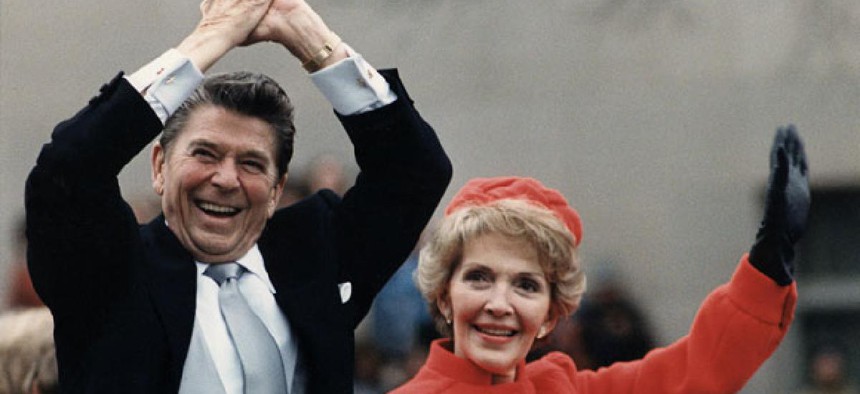
National Archives
In 1981, President Reagan, fresh from taking the oath of office, stepped to a microphone on the steps of the U.S. Capitol and fleshed out a theme that he had doggedly developed through months of campaigning: " In this present crisis," he intoned, "government is not the solution to our problem."
Lest anyone miss the point, Reagan hammered it home throughout the rest of his address:
It is time to check and reverse the growth of government which shows signs of having grown beyond the consent of the governed. It is my intention to curb the size and influence of the federal establishment and to demand recognition of the distinction between the powers granted to the federal government and those reserved to the states or to the people. All of us need to be reminded that the federal government did not create the states; the states created the federal government.
Reagan set a tone that has endured for more than 30 years. In fact, his rallying cry for limited government has become so firmly established -- through both Republican and Democratic presidencies -- that even when a president is making the case for an activist federal establishment (as President Obama did yesterday), he must insist that his proposals actually do not involve an excessive role for government.
So it was that Obama early in his second inaugural address, took pains to declare that while we have learned throughout American history that "a modern economy requires railroads and highways to speed travel and commerce, schools and colleges to train our workers," that "a free market only thrives when there are rules to ensure competition and fair play," and that "a great nation must care for the vulnerable, and protect its people from life’s worst hazards and misfortune," at the same time "we have never relinquished our skepticism of central authority, nor have we succumbed to the fiction that all society’s ills can be cured through government alone."
That was his address in a nutshell: a defense of the specific actions taken by the federal government to improve the lives of citizens, while at the same time arguing they didn't add up to any more government than was absolutely necessary to get the job done. And, Obama implicitly acknowledged, government wasn't doing that great at its job. "So we must harness new ideas and technology to remake our government," he pledged.
The president pledged action on a laundry list of causes from climate change to gay rights to limiting gun violence. But by the time Obama reached the end of the speech, it seemed that he had grown weary of the debate over government. Let's just agree to disagree, he said, do what needs doing, and leave the debating to the political scientists and historians:
Being true to our founding documents does not require us to agree on every contour of life. It does not mean we all define liberty in exactly the same way or follow the same precise path to happiness. Progress does not compel us to settle centuries-long debates about the role of government for all time, but it does require us to act in our time.
That may be President Obama's best hope for a succesful second term. But in the absence of consensus on the proper role for government in achieving the "progress" he desires -- or whether government even has a role -- getting a deeply divided Congress to act will be a big challenge.
NEXT STORY: FedPoem: A Ball for 40,000 People







